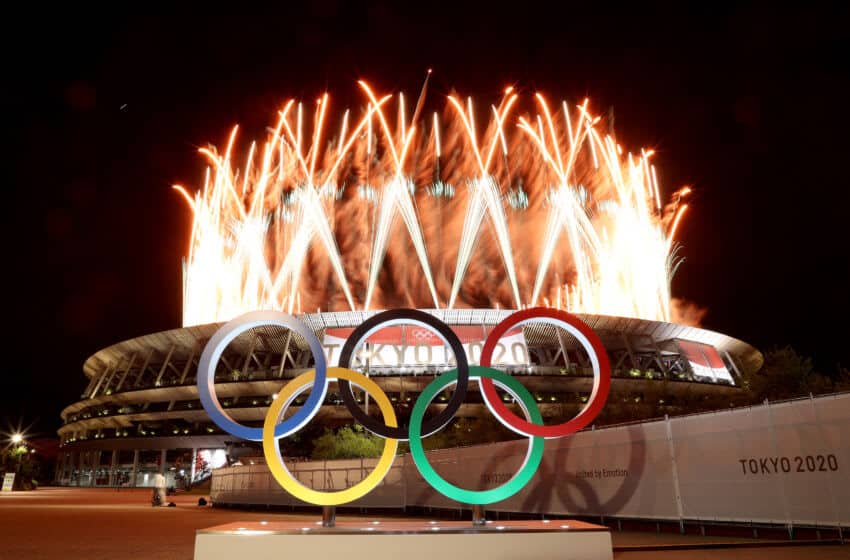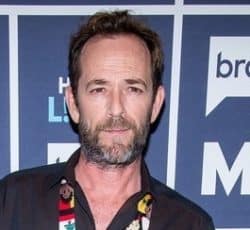ICYMI: Closing Ceremony Highlights
CLOSING CEREMONY – NBC & PEACOCK
Tirico on the Beijing Winter Olympics: “Just like the Summer Games, these Winter Games have made it to the finish line, though no one would deny the shadow that China’s place in the world – and a world that seems to be more troubled and complicated by the day – cast over the competition. It’s fair to question how we’re going to look back at these Games months, maybe years, into the future. Fair to question whether they should have been held here, and what they did and did not achieve. The U.S. government was not represented at the Games, the athletes of the world were. Nearly 2,900 of them from 91 different delegations getting to compete and realize dreams that were, in many cases, lifetimes in the making.”
Lipinski on the Closing Ceremony: “There’s something so special about a Closing Ceremony. It just hits different. There’s relief, there’s joy, it’s a celebration and you get to share that with your teammates one last time. One of the most memorable moments for me was walking into that stadium with all of the athletes rushing out, and now as a viewer it’s one of my favorite moments as well.”
Weir: “Tonight is a night of celebration…Olympic sports can feel at times like you’re on an island. It’s a little bit isolating, a little bit lonely, but tonight you really do feel like you’re a part of something bigger, like you’re a part of a team and you get to celebrate with that team, with that family. And we say it all the time, but once an Olympian, always an Olympian.”
Lipinski on entering the Parade of Nations as an athlete: “This moment is so much fun. I remember just stepping into that stadium and you feel so small, and then just looking around at all of these other athletes, your teammates, but you just realize this is so much bigger than you, than your sport. I still get chills.”
Weir: “You feel like a tiny water droplet in a very vast ocean when you’re standing in the middle of these giant stadiums…It’s just such a great moment to celebrate achievement and all of the hard work you’ve done to get there.”
Elana Meyers Taylor to Anne Thompson on her Olympic success: “It’s hard to even put into words. I don’t think it’s entirely set in yet. It’s going to take a while to really realize it, but I just want to go out there and perform the best I can day in and day and really leave a legacy and hopefully people look at this and see that winter sports is for everybody – Black, white, doesn’t matter. Winter sports is for all Americans.”
Meyers Taylor during her interview walking into the Closing Ceremony: “There are so many great moments. Erin Jackson, Jessie Diggins coming away with the silver medal today, everybody fought so hard from top to bottom. Lindsey Jacobellis, Nathan Chen, I could go on and on, and my own teammate, Kaillie Humphries just doing it all for Team USA…got to see Brittany Bowe and John Shuster…it’s just a part right now, celebrating Team USA and all we’ve accomplished, and also getting ready for the Paralympic Games.”
Weir on firsts at the Beijing Olympics: “Another exciting aspect of these Olympics was how many cool firsts there were. The first Black woman to win an individual gold medal at the Winter Olympics happened in Beijing, the first publicly out non-binary athlete to compete at the Olympics happened in Beijing, and the first Orthodox Jewish woman to compete at the Winter Olympics happened in Beijing.”
Weir on the 2026 Milano Cortina Olympic Winter Games: “For the time first ever, an Olympic Games was chosen by popular vote. That’s the one I voted for.”
Gannon on 2026 Olympic Winter Games in Italy: “Are you packing already?”
Weir: “In my head, in my head. I’m so excited.”
Tirico in his closing essay: “We saw so many tears of joy, tears of sadness, maybe it was the emotion of two hard years en masse. We saw ‘I love yous’ connected across oceans by technology, shared by teams of friends and family who made individual dreams come true. Those smiles, that joy, it’s so much of what so many of us need in world that feels more uphill every day. The Olympics have always been imperfect, and maybe more so now than ever before. There are real challenges ahead for this movement. But nothing else brings the world together like this. But with troops amassing and militaries maneuvering, these 18 nights again reminded us of the power of sport, the power of people, and the power of the Games to galvanize. So as we formally say goodbye to these Olympics, we’ll spend every one of the next 887 days hoping that scene on the Seine to open the 2024 Summer Games in Paris will be the start of something special.”
ON FIGURE SKATING
Lipinski on Kamila Valiyeva: “It was the saddest thing that I have ever witnessed in all of my years in skating and covering events. I had this image – we say it all the time, she’s 15 and she should not be to blame for this – I just had this image when she took the ice of, you know when little girls get pushed out by their coaches just to glide to center ice? That’s what I felt they did to her. ‘You deal with this.’ And then we had to watch one of the greatest skaters to ever live, which we’ve said many times, fall apart, and it was devastating to see the reception she had when she came off the ice, just to see what she is dealing with and what she should have never had to deal with. And beyond that, the Olympic champion Anna Shcherbakova just standing there with a teddy bear and not a hug in sight. It was heartbreaking.”
Weir: “I think we can safely say that we were with everyone that was watching the coverage of the women’s free skate in that you didn’t leave it feeling good, you don’t leave it feeling good about your sport, and I hope it’s an event that we never see again. For Kamila Valiyeva, it was a performance that shouldn’t have happened. It was a performance that she was allowed to give because a court decided she was allowed to to protect her, primarily mentally…but what did they think happened after that performance? … Reflecting on the actual event, it was horrifying, it was traumatic for everybody involved.”
Weir on Team USA’s performance: “It was a tremendous event for Team USA figure skating. I think it provided a lot of inspiration for the young skaters here to see people from their country succeeding and succeeding on the biggest stage…Nathan Chen has been leading to this moment for the last four years. It was redemptive, it was magical, and it was such a study in preparation and a study in fortitude and strength that I think that is the silver lining. The happy ending for the Olympics is Nathan Chen.”
ON SNOWBOARDING
Shaun White to Tirico on how he felt after his last run in Beijing: “I was very overwhelmed to be finally living this moment that I heard about when I was a kid. You know, ‘One day you’ll retire.’ And I just thought that was so far out, and to actually be living that moment was incredibly overwhelming.”
White on snowboarding becoming one of the major sports at the Winter Olympics: “I love it. I think that’s such a crowning moment for our sport and me, from not being allowed to be on resorts to now being the premier thing that people tune in for. There was a lot that went into it after the Olympics…I would get asked to do all of these kind of stereotypical snowboard things that you would expect, and I had to hold my ground and say, ‘No, I’m actually not what you think. I’m going to show up and tell you this amazing story about my experience and tell you that the sport of snowboarding isn’t just what you see on TV’ … my mom does it, my dad, there’s a culture behind it where you’re enjoying time with one another. To get that across and bring the sport into the light in that way was a pressure situation for me because I’m speaking for others in this community, but I was proud and honored to be the face of the sport for so long.”
OLYMPIC GOLD – NBC & PEACOCK
Tirico on Mikaela Shiffrin’s Olympics: “She came to Beijing with high hopes of adding to her collection in multiple events, but a very different story unfolded. The very first weekend of the Games, the giant slalom, an uncharacteristic result for Shiffrin. Over the last three years, Mikaela Shiffrin had skied out of one these races only once. Now, she did it twice in just a few days and she sat on the hill on Wednesday for several minutes in the snow, shell-shocked. But if it seemed like that image would define her Games, it turned out something else did. The notion that as these Games continued, Shiffrin continued to race. And after each event, was so open about what she was going through. This past Thursday came her last real hope at gold – the combined – and an undeniable sense of déjà vu. Yet there was Mikaela yesterday, sticking around – even changing her flight – for a postponed team event, and finally making it down the hill in a technical event. It wasn’t the story she had come to the Olympics wanting to write, but it was a story about resilience, the value of simply trying, and the ability to live with disappointment. At 26, Mikaela Shiffrin’s Olympic journey is likely not over, and you get the sense she has a lot more to show us, and teach us, over the years to come.”
Andy Browne on the experience of Beijing hosting these Olympics: “This was an opportunity for the United States and China to build bridges, but I’m afraid it may have had the exact opposite effect, that it may have thrown up more barriers. I mean, to me, it underscored the reality that the United States and China are living in completely separate worlds. We were there, the journalists were there, the athletes were there, the coaches were there, but we weren’t there. We were in this closed loop bubble. We were on the outside looking in. We were looking at China through wire mesh fences…In a wider sense, of course this isn’t just Covid, Covid has made it worse. In a wider sense, these two countries are drifting apart. There is no real conversation, there is no communication and there is no immediate end in sight to this.”
Jing Tsu: “Essentially, we’re exactly where we were at the beginning of these Olympics, where we said there’s clearly a story to the outside and a story to the inside, and the two did not cross streams. So we remember, when we saw the Uyghur athlete we saw what we saw (related to) human rights, but for the Chinese, that was a symbol of national unity. So I think throughout the Olympics, that was the metaphor that carried through. We were seeing one thing and they were seeing another.”
Tsu on the Games from the Chinese perspective: “I think for the Chinese, they thought it was a success. They had the story that they wanted and they took pleasure in the athletes, they took pleasure in Eileen Gu, they won medals, they won more gold than the United States, and essentially for them it was a party. It was a festivity where they came together, got to gossip about the athletes, completely different than what we’re seeing here in western media.”
Browne: “I would agree with that. I think that at key moments though, your audience in China is watching a very different Olympics. They’re not having a dialogue or understanding the political controversy, they are not hearing about the diplomatic boycott, they’re not seeing Peng Shuai. Peng Shuai is a ghost, she’s invisible. I mean, she’s out there performing mainly for the international press. But then, the way that the Games were portrayed so the camera lens focuses in quite narrowly on the snow-covered mountains, but the lens is rarely widened to see the arid, brown mountains behind.”
***
ABOUT NBC OLYMPICS







